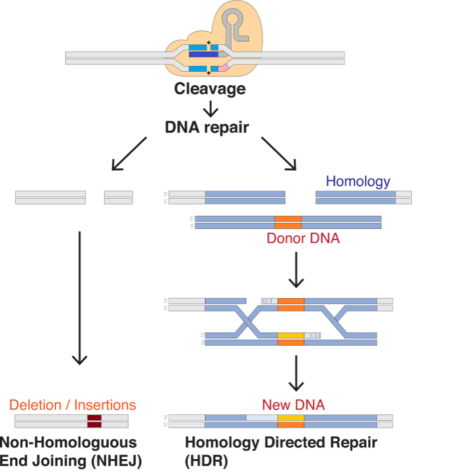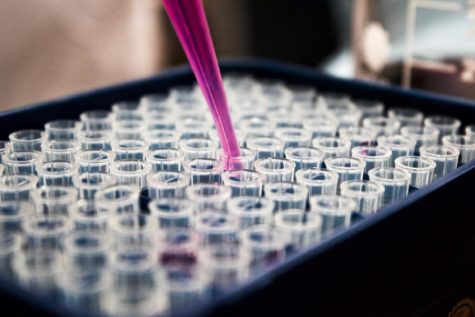Gene Editing
Is designer DNA taking technology too far?
Would you like to see a future where your genes can be enhanced/edited?
- Yes (0%, 0 Votes)
- No (0%, 0 Votes)
- I don't know (0%, 0 Votes)
Total Voters: 0
Many people nowadays are contemplating whether science has been taken little too far. On the other hand, there is also an exceptional amount of people who are entirely encouraging of taking research and inventions even farther. Many also lie somewhere in the middle. Genetic engineering is a perfect example of such a controversy between the scientific community and the public; as well as civil wars within the public. Many factors attribute to ethical strife of gene editing, but a conclusion on the matter falls upon each individuals morals and ideals.
What exactly is gene editing? Gene editing is a technique used to efficiently modify the DNA within a cell. The modification is done by enzymes (engineered nuclei) cutting certain DNA sequences–either adding, removing or altering the genome in the DNA, thus leading to significant changes in the characteristics of the cell and or organism. The enzymes do two things: One part cuts the DNA while the other part guides the nucleus to the targeted part of the DNA sequence.
Scientists can control the healing process to further change the DNA in that specific point in the genome. In small DNA changes, the cell instinctively heals the cut, joins the two ends back together, and then results in a mutation in the sequence (meaning it doesn’t function anymore). When removing a section of DNA, the nuclei make cuts to either side of the intended sequence, and when it tries to repair itself, it will accidentally connect the wrong ends of the DNA together, thus removing the section that was between the cuts.
When inserting a section of DNA, scientists essentially ‘hijack’ the inherent repair system. Before a cell divides, it makes a replica of its DNA so that both of the daughter cells have an exact and full copy of its parents genome. Say there was a malfunction in one of the copies– that cell would then repair itself by using the other copy as a ‘blue-print’ for it’s reconstruction, resulting in matching cells.
We can take advantage of this process with genome editing. By cutting the DNA and then implanting a new piece of alike DNA in the manipulated site, it causes the cell to use this new section of DNA as the ‘blue-print’/template for fixing the break, filling it with a copy of the new and desired DNA.

There are two types of cells- germline: sex/reproductive cells, and somatic: anything but reproductive cells. When modifying a germ cell, the changes are made within the egg, sperm, or embryo–ultimately altering all of the cells in ones body. The changes made to the original individual’s DNA carry into the offspring. When modifying somatic cells, the editing is targeted to a specific type of cell (skin cells, lung cells, blood cells, etc), and the modification is non-inheritable.
On the whole, there is little conflict over the ethics of modifying somatic cells because it can treat somatic mutations/serve as ‘gene therapy’. These cells can carry diseases caused by mono-genetic disorders (single gene defect) as well as poly-genetic disorders (multiple genes involved, may depend on environment), such as Alzheimer’s, muscular dystrophy, HIV, Parkinson’s, Schizophrenia, etc..
On the other hand, tampering with the DNA of germline cells is extremely controversial, and has been since it was discovered in 1972. Germline engineering is already outlawed in 40 different countries around the world, as they are concerned with the social and safety issues that could potentially arise from it.

With the inevitable enhancement and growth of technology, humans can expect to foresee a future where designer babies are anything but science fiction. As of now, scientists are able to manipulate simple attributes–like eye color, freckles and oddly enough, earwax type. Controlling the complex attributes like intelligence, height, and athletic ability is still under progress, but Jennifer Dounda, founder of CRISPR, is positive that technology will advance to that point in the near future.
Many arguments arise when discussing the ethics of reproductive gene editing, and whether or not it would be at all beneficial to our society. Concerning justice and equity, it is quite probable that gene editing will only be available to the wealthy, inevitably leading to a new race of individuals defined by their ‘superior’ and engineered DNA thanks to their economic privilege. This means that gene editing will transform from therapeutic uses to enhancement uses. Why would parents feel the need to revolt against nature by picking and choosing the germline chemistry of their child, when it is not called for for therapeutic reasons? Why go to such extreme lengths so your child can have blue eyes?
Since it is considered gene ‘enhancement’, it essentially means to ‘better’ a human in whatever way the parents choose. This will inherently lead to the formation of beauty and intelligence standards, created by the societal conformity existing only because humans, knowingly or not, encourage it. Also, since gene editing is a relatively new technology, it will also only increase existing disadvantages regarding health care and other interventions. This means the poor get poorer, so the rich get richer- it also works vice versa.
Do you care about humans being "manufactured" gene enhancing became apart of our future?
- Yes (0%, 0 Votes)
- No (0%, 0 Votes)
- I don't know (0%, 0 Votes)
Total Voters: 0
Religious and moral standpoints sway opinions on the ethics of gene editing. In the eyes of some, its seen as ‘playing with God’ and violating the idea that we’re made in God’s image. Consent from the fetus is yet another controversy, for the future generations produced by the originally-edited embryo will also be affected by the parents choice to engineer its DNA or not. However, parents already make many decisions that affect their child and its future, so where does consent from the fetus (for anything in general) begin and end?
Skyler Smith, a sophomore at Lafayette High School, shared her opinion on the ethics of genome editing. She believes that when ‘enhancing’ DNA, it disregards one’s natural identity and only implements a manufactured appeal. Concerning societal affects, she claims that enhancement will eradicate the beauty of diversity in this world, as well as increase mental health issues of self-esteem and inadequacy. Skyler also defends the right of consent for the children undergoing genome enhancement, and feels its morally wrong to make this permanent of a decision when it is impossible to receive the embryo’s take on it. When asked why she was so strongly against it if she had the choice to engineer her kid or not, she stated, “Even though I wouldn’t wish to participate in genome editing, I still care a lot about the negative affects it would have on society and people as a whole. I don’t see how gene enhancement would really improve anything in the grand scheme of things.”

Regardless of our ability to take gene editing to the extent of engineering ‘humans’ in a lab, a docuseries on Netflix, Unnatural Selection, claims it wouldn’t become a significant part of our future unless the majority of the public and laws instituted by the government permitted it.

No matter your stance on the engineering of somatic and or germline cells, the pursuit of enhancing science will never cease as long as humans walk this earth. There is no single policy that would fully apply to every individual case. The ethics and viewpoints of this matter will eternally remain subjective. The fate of the world is carried on the backs of the larger whole’s opinion– is granting permission to release genome enhancing to the public viable or not?


